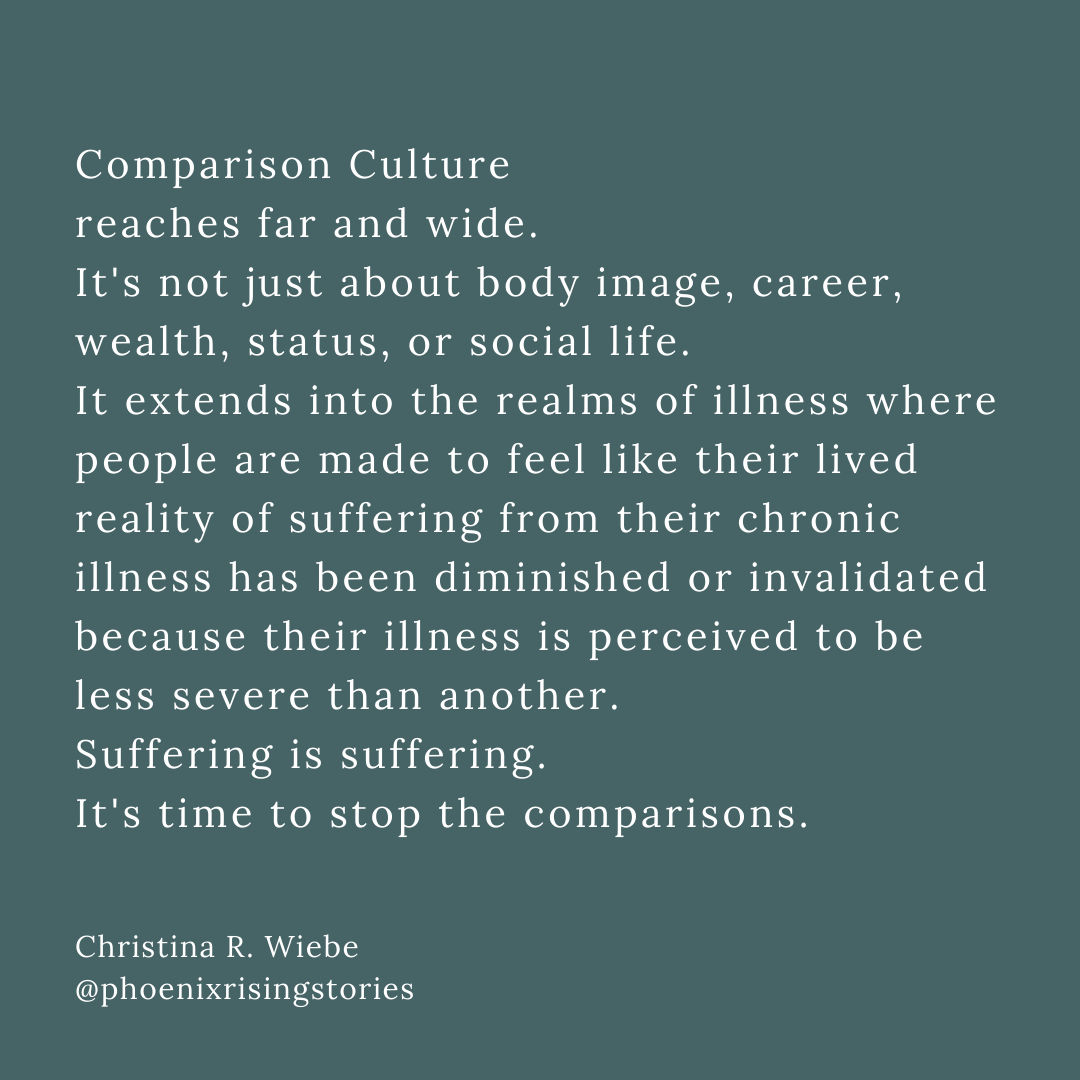Comparison Culture & Chronic Illness: Please Stop The Comparisons
 “At least you don’t have cancer!”
“At least you don’t have cancer!”
I’ve lost count of the number of times I’ve gotten this response when asked about the chronic diseases that I suffer from.
Now let’s get this out of the way first:
We’re not talking about the benefits of opening oneself up to different perspectives because of course, it is important to be able to look beyond the tunnel vision of what you’re experiencing.
What we are talking about here is when the language, tone, and context in which a person says something like this goes no further than to make a comparison between your illness and another illness that they feel is much worse than yours with the expectation that you will be grateful that you “don’t have it so bad”.
Yes, I am beyond grateful that I do not have cancer. I have lost far too many loved ones to cancer so I know the depth of that pain and I know how real of a threat it is to life.
And when I say this next part, I am not doing it with the intention of trying to claim that what I’m dealing with is worse but to create some awareness around why people can’t use other diseases like cancer as a blanket statement that acts as a benchmark for the worst kind of illness you can have.
While I have seen how horrific, debilitating, and life-threatening cancer is, I have also seen people get diagnosed with cancer, undergo the nightmare of cancer treatment, go into remission, and then proceed to move forward with their lives. They get to return to their careers, regain their social lives, and set out on travel adventures within the time that I have remained incapacitated and housebound by Central Sensitivity Syndromes.
Just putting this out there: people die from Myalgic Encephalomyelitis too. Not many people know this but it's true, and it's one of the conditions I have. I hope this opens your eyes to other illnesses out there that are not as recognized but as just as debilitating and life-threatening in their own ways.
So this is why I am bringing up this touchy subject: 𝐈 𝐰𝐚𝐧𝐭 𝐭𝐡𝐞 𝐜𝐨𝐦𝐩𝐚𝐫𝐢𝐬𝐨𝐧𝐬 𝐭𝐨 𝐬𝐭𝐨𝐩. It's time for comparison culture to go! I want people to be aware that using seemingly innocuous language like “at least” is the most direct path to making someone feel invalidated, diminished, belittled, and invisible in their suffering.
People are too complex and illnesses are too complex to even begin to be able to make any sort of fair comparison. How one illness presents itself in one person is significantly different from how it presents itself in another. The impact of an illness on a unique person’s life extends through countless layers that are too intricate and complex to adequately convey unless you are actually living their experience (which is impossible). Suffering is suffering.
𝐘𝐨𝐮 𝐝𝐨 𝐧𝐨𝐭 𝐧𝐞𝐞𝐝 𝐭𝐨 𝐛𝐫𝐢𝐧𝐠 𝐮𝐩 𝐚𝐧𝐨𝐭𝐡𝐞𝐫 𝐝𝐢𝐬𝐞𝐚𝐬𝐞 𝐰𝐡𝐞𝐧 𝐭𝐚𝐥𝐤𝐢𝐧𝐠 𝐭𝐨 𝐬𝐨𝐦𝐞𝐨𝐧𝐞 𝐰𝐡𝐨 𝐢𝐬 𝐢𝐥𝐥. You might think you’re giving them perspective but what you’re actually doing is crushing them and making them feel like they have no right to feel the way they do about their suffering. And if you are someone who has never experienced the agony and complexity of suffering with a chronic disease, then that is when it is even more crucial for you to (and I say this with respect) close your mouth and open your ears.
𝐋𝐢𝐬𝐭𝐞𝐧. 𝐀𝐧𝐝 𝐭𝐡𝐞𝐧 𝐥𝐢𝐬𝐭𝐞𝐧 𝐬𝐨𝐦𝐞 𝐦𝐨𝐫𝐞. And when it is time for you to speak, I ask that you be mindful of the words that you are about to express. Do not start your response with, “At least” because that launches into an immediate comparison that invalidates that person’s experience.
𝐀𝐜𝐤𝐧𝐨𝐰𝐥𝐞𝐝𝐠𝐞 what they’ve shared. Acknowledge that their suffering matters to you.
𝐃𝐨𝐧’𝐭 𝐛𝐞 𝐚𝐟𝐫𝐚𝐢𝐝 𝐭𝐨 𝐧𝐨𝐭 𝐡𝐚𝐯𝐞 𝐚𝐧𝐲 𝐚𝐧𝐬𝐰𝐞𝐫𝐬 𝐨𝐫 𝐧𝐨𝐭 𝐡𝐚𝐯𝐞 𝐚𝐧𝐲𝐭𝐡𝐢𝐧𝐠 𝐡𝐞𝐥𝐩𝐟𝐮𝐥 𝐭𝐨 𝐬𝐚𝐲 (because here’s the secret: there are no clear cut answers when it comes to chronic illness so of course you can’t provide a helpful answer! Let that release you from the guilt of being helpless.)
Don’t be afraid to say instead, “𝐈’𝐦 𝐬𝐨𝐫𝐫𝐲. 𝐓𝐡𝐚𝐭’𝐬 𝐫𝐞𝐚𝐥𝐥𝐲 𝐟𝐮𝐜𝐤𝐢𝐧𝐠 𝐬𝐡𝐢𝐭𝐭𝐲. 𝐈 𝐝𝐨𝐧’𝐭 𝐮𝐧𝐝𝐞𝐫𝐬𝐭𝐚𝐧𝐝 𝐰𝐡𝐚𝐭 𝐲𝐨𝐮’𝐫𝐞 𝐠𝐨𝐢𝐧𝐠 𝐭𝐡𝐫𝐨𝐮𝐠𝐡 𝐛𝐮𝐭 𝐈 𝐬𝐞𝐞 𝐲𝐨𝐮, 𝐈 𝐡𝐞𝐚𝐫 𝐲𝐨𝐮, 𝐈’𝐦 𝐡𝐞𝐫𝐞 𝐟𝐨𝐫 𝐲𝐨𝐮. 𝐋𝐞𝐭’𝐬 𝐭𝐚𝐥𝐤 𝐚𝐛𝐨𝐮𝐭 𝐡𝐨𝐰 𝐈 𝐜𝐚𝐧 𝐛𝐞𝐬𝐭 𝐛𝐞 𝐡𝐞𝐫𝐞 𝐟𝐨𝐫 𝐲𝐨𝐮.”
If you are someone who is dealing with a chronic disease, what else would you want to hear from another person? What would be beneficial to you in terms of meaningful support?
If you are someone who is healthy but maybe knows someone who is ill, what questions do you have?
𝐋𝐞𝐭’𝐬 𝐬𝐭𝐚𝐫𝐭 𝐚 𝐡𝐞𝐥𝐩𝐟𝐮𝐥 𝐝𝐢𝐬𝐜𝐮𝐬𝐬𝐢𝐨𝐧.